2020届高三一轮复习:专题3 代词
高三英语总复习课件:语法3代词

《 走 向 高 考 》 高 考 总 复 习 英 语 配 人 教 实 验 版
· ( )
必修二 例
Units 1-2 (2008·浙江)—I'd like some more cheese. B.none D.few
《 走 向 高 考 》 高 考 总 复 习 英 语 配 人 教 实 验 版 )
C.it
D.one
·
解析:句意:在西安市区租住房屋的费用比该市任 何其它的地方都要高。由四个选项看填一代词来代替名词
(
短语 the cost of renting a house; the cost 为不可数名词,
要用 that 表替代;this 不可用来表替代;it 指同名同物; one 只替代可数名词单数。 答案:A
· (
首页
上页
下页
末页
必修二
Units 1-2
(3)nothing意为“没有东西”,一般回答what提问的 句子。 —What's in the cave? 洞里有什么?
《 走 向 高 考 》 高 考 总 复 习 英 语 配 人 教 实 验 版 )
—Nothing.
没什么。 (4)neither指“两个人或物中一个也不,两者都不”,
《 走 向 高 考 》 高 考 总 复 习 英 语 配 人 教 实 验 版 )
就可接单数名词。
Would you please make it some other day ? ( = another day)改日做此事好吗?
· (
I have no other place to go.
我再也没有别的地方可去。
Nanjing in winter.
高考语法复习之三代词,考点梳理+真题练习(含有答案和讲解)
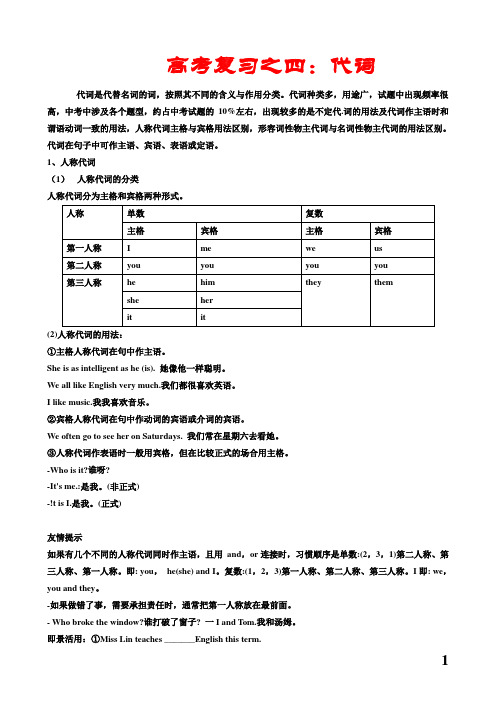
高考复习之四:代词代词是代替名词的词,按照其不同的含义与作用分类。
代词种类多,用途广,试题中出现频率很高,中考中涉及各个题型,约占中考试题的10%左右,出现较多的是不定代.词的用法及代词作主语时和谓语动词一致的用法,人称代词主格与宾格用法区别,形容词性物主代词与名词性物主代词的用法区别。
代词在句子中可作主语、宾语、表语或定语。
1、人称代词(1)人称代词的分类人称代词分为主格和宾格两种形式。
(2)人称代词的用法:①主格人称代词在句中作主语。
She is as intelligent as he (is). 她像他一样聪明。
We all like English very much.我们都很喜欢英语。
I like music.我我喜欢音乐。
②宾格人称代词在句中作动词的宾语或介词的宾语。
We often go to see her on Saturdays. 我们常在星期六去看她。
③人称代词作表语时一般用宾格,但在比较正式的场合用主格。
-Who is it?谁呀?-It's me.:是我。
(非正式)-!t is I.是我。
(正式)友情提示如果有几个不同的人称代词同时作主语,且用and,or连接时,习惯顺序是单数:(2,3,1)第二人称、第三人称、第一人称。
即: you,he(she) and I。
复数:(1,2,3)第一人称、第二人称、第三人称。
I即: we,you and they。
-如果做错了事,需要承担责任时,通常把第一人称放在最前面。
- Who broke the window?谁打破了窗子? 一I and Tom.我和汤姆。
即景活用:①Miss Lin teaches _______English this term.-You are lucky .______is a very good teacher.A.our She; He,SheD. ours; He答案:C点拨:本题考查人称代词主格与宾格的用法区别。
高三英语一轮复习代词的语法复习课件
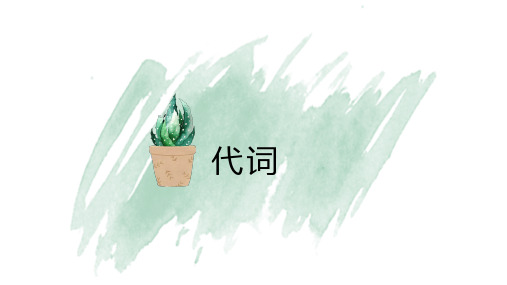
句法功能
3.作定语时须用所有格 The students borrowed each other's notes. 学生们互借笔记。
指示代词分单数(this/that)和复数(these/those)两种形式,既可作
限定词又可做代词。
例如: 1.限定词 This girl is Mary. 这个女孩是玛丽。
句法功能及用法
1.形容词性物主代词 形容词性物主代词一般位于名词前,用作定语,限定该名词的 意义 I like his car. 我喜欢他的小汽车。
John cut his finger. 约翰割破了手指。
句法功能及用法
2.名词性物主代词 (1)作主语
May I use your pen? Yours works better. 我可以用一用你的钢笔吗? 你的比我的好用。
2.代词 This is Mary. 这是玛丽。
Those men are my teachers. 那些人是我的老师。
Those are my teachers. 那是我的老师们。
句法功能
指示代词在句子中可充当主语、宾语、表语、定语。
1.主语 This is the way to do it. 这事儿就该这样做。
(3)作表语 The life I have is yours. It's yours. 我的生命属于你,属于你。
(2)作宾语 You may use my pen. I'll use hers. 你可以用我的笔,我用她的好了。
(4)与of连用 He is a close friend of ours. 他是我们的一位亲密朋友。
个”,作定语时可修饰可数或不可数名词。
They didn't have any friends here. 他们在这里没有朋友。
高三英语一轮复习 语法专练三代词

兴国三中高三英语语法专练〔三〕——代词1. Tom and (me) are to blame for the broken glass.2. All but (he) are here; let’s begin.3. There is a knock on the door. I wonder whois at such a late hour.4.—Who is at the door?—is me.5. It was in the park Mrs Smith first met Mr Smith.6.—Who is the man in the picture?—is Mr White.7.—I’ve been informed of the latest news.—Oh, what is ?8. is stupid of you to be late for such an important interview.9. felt funny watching my son making faces.10. was reported that a large number of people got killed in 5·12 Sichuan earthquake.11. was in Guangzhou that the 16th Asian Games were held.12. is no wonder China has achieved many breakthroughs创作;朱本晓2022年元月元日in astronomy so far.13. —My deskmate has made his goal to go to Beijing University.—No wonder he has been working. So hard.14. I would appreciate if you can come to help me with my apple-picking.15. He didn’t make clear when and where their wedding would be held.16. I hate when the weather is rainy.17.—He got his first book published. It turned out to be a best-seller.—When was ?—was in 2021 when he was still in college.18. is two years since I left my hometown.19. won’t be long before we meet again.20. is Tom and Lucy that were absent from the meeting.21. worries me the way my son behaves in front of guests.22. was at ten o’clock that the match began.23. It was with great joy he received the news that创作;朱本晓2022年元月元日his lost daughter had been found.24. As Chairman Hu puts , the Chinese will never give in to natural disasters.25. It was not until he fell ill he realized the importance of health.26. Though English is hard, I think I can make .27. When comes to playing football, Mike will come to life.28. To refresh ourselves, our teacher has (we) students do some physical exercise between classes.29. This is (we) garden.30. The man hit the boy in face.31. The baby smiled on seeing mother.32. Your pen writes better than (my).33. (they) house is bigger than(our).34. A friend of (me) came to see me yesterday morning.35.—Whose eraser is this?—It’s (he), I think.36. I caught my little sister by hand.37. The old woman is blind in left eye.创作;朱本晓2022年元月元日38. This beautiful garden is (my),39. (I) ruler is longer than(she).40.—Whose bike is this?—It’s (he)41. (we) house is bigger than (they).42. I have a dog. Ears are white.43.—Who wanted to see me while I was out?—A man calling (him)Tom.44. I can’t express (me) owing to my excitement.45. It is wonderful to see the human body healsafter an injury.46. She is absent from class today, for she isn’t quite.47. He often teaches English in his spare time.48. Don’t be nervous. Make at home.49.—May I use your pen?—Certainly. Help .50. The children enjoyed in the park last Sunday.51. He didn’t believe my words. He wanted to see the situation for .52. He likes to keep his thoughts to .创作;朱本晓2022年元月元日53. I don’t want any help. I want to do it by .54. He devoted to doing his research.55. The girl worked out the problem by .56. The door opened .57. We kept the secret to .58. In that situation, both of them had to forget each (other) own interest and unite closely.59. The two boys often help other and get on very well.60. Who cares for one life and death in such a terrible earthquake?61. The two men said they would help each in face of danger.62. The story was passed down from one generation to.63. The beggar begged from one house after .64. After lunch, my parents went to work in the field one after the .65. School was over and the students went out of school gate one after .66. I’m moving to my mountain village because the air there创作;朱本晓2022年元月元日is much fresher than in the city.67. The water in this lake is clearer than in the river near my home.68. The life in the countryside is easier than in the city.69. He lived in America for about two years. Afterhe left for Japan.70. The weather in my hometown is warmer than in this city.71. Knowledge from real life isn’t easier to forget than achieved from textbooks.72.—Hello! Who’s that?—Hello! Is John.73. The apples on the trees are bigger than in the basket.74. We invited John and Jack, but of them could afford time to come to the party.75. You can contact me by telephone or by sending E-mails or.76.—Which drink do you prefer, tea or coffee?— . I’d like some juice.创作;朱本晓2022年元月元日77. Beijing and Tianjin are big cities.78. I like French and Russian.79. There are trees and flowers on side of the road.80. There’re two pens on the table. But I don’t wantof them. They won’t write well.81. of the two girls is fit for this job. In other words, they are not equal to this job.82.—When shall we meet, on Friday or Saturday?—day is OK. It’s up to you.83. You can go to the teacher or go to your classmates for advice or use ways.84.—Would you like some tea or water?— . I’d love some coffee.85.—When shall we meet, on Friday or Saturday?—day is OK. It’s up to you.86.—Which do you prefer, milk or orange?—are to my taste.87.—Who will deliver the speech, Tom or Mike?— . They’re not available.88.—of my parents is for my plan.—They disagree with it.创作;朱本晓2022年元月元日89.—Do you want tea or coffee?— . I really don’t mind.90. I have three sets of cookers. of them are new.91. that is needed for the party is ready.92. I had to buy of these sweaters because I didn’t know which one was better.93. There are many people surrounding the injured, butof them are willing to give a hand.94. We two owe nothing to .95. I want to drink some tea but there’s left in the teapot.96. There is food left on the table. It’s been eaten up.97. There is not water today.98.—How much water did you drink?— .99. I have three sons. of them is a doctor.100. He has four dogs. of them are loyal to him.101.—How many apples did you buy?— . The prices are too high.创作;朱本晓2022年元月元日102. There are a lot of children over them. Are enjoying themselves.103. I want to drink some water, but there’sleft in the glass.104. We have only a sofa, a table and a bed in our apartment. We need to buy more furniture.105. There’s person who wants to see you.106. Tom, Mr Green is waiting for you at the school gate.107. Would you like bread?108.—Which book can I take out of the library?—one will do.109. If you are better, you can go out to play.110.—When shall we go to visit the Water Cube?—day you like. I’m not busy this week.111. If you have questions, please come to me.112.—Could I have orange?—Of course, as you please.113. I got the story from the farmer and somevillagers who lived in this village.114. I can’t go with you to the park today. Let’s make it创作;朱本晓2022年元月元日other time.115. Ants have two stomachs. One is for themselves and the is for folks back home.116. Some people like music. are fond of sports.117. Must you go now? I want you to stay here few days.118. Two hundred yuan is not enough. I still needfifty yuan to cover my living expense.119. Many people are visiting the Bird’s Nest. Some are talking; are taking photos.120. There’re forty-five students in my class. Twenty are from the country, and the are from the town.121. Some girls are fond of art. girls are into music.122. We have three sets of garden tools. One of them is old. The two are new.123. There are then girls in this interest group butis as outstanding as Lucy.124. A group of boys walked along the path,having a hat on his head.125. To our surprise, she is holding a baby in创作;朱本晓2022年元月元日hand.126. On side of the lake, there are wild flowers.127. I want a box for my books, that isn’t too big.128. The man has written many poems but few go od .129. Though the test is easy, not students can pass it.130. There are eggs at home. Could you go and buy some?131. The problem is so complex that only a of us can figure it out.132. I’m so busy that I have time to relax.133.—Would you like some more cream?—Just .134. He can speak Japanese but not much.135. Tom made mistakes in the exam and got eighty marks.136.—Who’s that at the door?—is the milkman.137. It’s an either-or situation-we can buy a new car this创作;朱本晓2022年元月元日year or we can go on holiday but we can’t do .138. Larry asks Bill and Peter go to on a picnic with him, but of them wants to, because they have work to do.139. Sarah made to the airport just in time to ca tch her plane this morning.140. I got this bicycle for : my friend gave it to me when she bought a new one.141. The doctor thought would be good for you to have a holiday.142. I’ll spend half of my holiday practicing English and the half learning drawing.143. The employment rate has continued to rise in big cities thanks to the efforts of the local governments to increase .144. Being a parent is not always easy, and being the parent of a child with special needs often carries withextra stress.145. Those who smoke heavily should remind of health, the bad smell and the feelings of other people.146. When he took his gloves off, I noticed thatone had his name written inside.创作;朱本晓2022年元月元日147. To stay awake, he finished a cup of coffee and ordered .148. If our parents do everything for us children, we won’t learn to depend on .149. At our factory there are a few machines similar to described in this magazine.150. We feel our duty to make our country a better place.151. in my life impressed me so deeply as my first visit to the Palace Museum.152. In some countries, people eat with chopsticks, while in , knives and forks.153.—Have you figured out how much the trip will cost?—$4,000, or like that.154. We have various summer camps for your holidays. You can choose based on your own interests.155.When you introduce me to Mr Johnson, could you please say for me?156.—When shall I call, in the morning or afternoon?— . I’ll be in all day.157. can be good at something for 40 years if he创作;朱本晓2022年元月元日doesn’t love it.158. My brother would like to buy a good watch butwas available from that shop.159. Why don’t you bring to his attention that you’re too ill to work on?160. Swimming is my favourite sport; there islike swimming as a means of keeping fit.161. Susan made clear to me that she wished to make a new life for herself.162. I’ve lived in New York and Chicago, but don’t like of them very much.163. When you are done with the book, just give it to Lucy or Helen or .164. The two girls are so alike that strangers finddifficult to tell one from the other.165. Helping others is a habit, you can learn even at an early age.166. A smile costs , but gives much.167.—John, when shall we meet again, Thursday or Friday?— . I’ll be off to London then.168.—Silly me! I forget what my luggage looks like.创作;朱本晓2022年元月元日—What do you think of over there?169. He had lost his temper and his health in the war and never found of them again.170. Good families are much to all their members, butto none.171. Sophia waited for a reply, but came.172. To her joy, Della earned first the trust of her students and thenof her colleagues.173. If you’re buying today’s paper from the stand, could you get for me?174.—Would you like tea or coffee?—, thank you. I’ve just had some water.175. An average of just 18.75 cm of rain fell last year, making the driest year since California became a state in 1850.176. Half of surveyed in 16countries say they go first to their closest friend to share their deepest wishes and darkest fears.177. Studying Wendy’s menu, I found that many of the items are similar to of McDonald’s.创作;朱本晓2022年元月元日178. Since people are fond of humour, it is as welcome in conversation as else.179. that’s important is that you are doing your best and moving in the right direction.180. You can ask anyone for help. here is willing to lend you a hand.181. This project requires close teamwork.will be achieved unless we work well together.182. Surprisingly, Susan’s beautiful hair reached below her knees and made almost an overcoat for her.183. You are a team star! Working with is really your cup of tea.184. I knew that would ever discourage him; he would never give up wanting to be a director.185. I’d appreciate if you could let me know in advance whether or not you will come.186. Although Rosemary had suffered from a serious illness for years, she lost of her enthusiasm for life.187. No matter where he is, he makes a rule to go for a walk before breakfast.188. The cost of renting a house in central Xi’an is higher创作;朱本晓2022年元月元日than in any other area of the city.189. She’d lived in London and Manchester, but she liked and moved to Cambridge.190. The traffic on the main streets has a longer green signal than on the small ones.191. New technologies have made possible to turn out new products faster and at a lower cost.192. There is in his words. We should have a try.193. On my desk is a photo that my father took ofwhen I was a baby.194. I have no time to read of Liu Lianz i’s novels, but judging from Legend of Concubine Zhen Huan I’ve read, she is very promising.195.—How much pepper did you put in the soup?—I’m sorry to say, . I forget.196.—What do you think of the price of these computers?—They are at least equal in price to, if not cheaper than, the at the other companies.197. Shopping on the Internet enables people not to search for goods from one store to .198. You may depend on that they are of much value.创作;朱本晓2022年元月元日199. I found a very beautiful coat in a shop this morning, and I’m going to buy this afternoon.200.—There’s in what she said.—You are right. We’d better take her advice.201. Lily and Jane are strict with themselves and I seldom find of them late for class.202. The professor’s lecture was butinteresting, and most of us fell asleep.203.—How about going fishing this afternoon?—Not today. other day is fine with me.204.—Is the professor leaving the day after tomorrow?—No. He is sure to stay here for three or four days.205. We shouldn’t take for granted that we still have a lot of time before the Entrance Examination.206. When asked for my views about the teaching job, I told the journalists that I found indeed demanding but rewarding.207. is known to all that California is the most multicultural state in America.208.—There is still a copy of the book in the library. Will创作;朱本晓2022年元月元日you go and borrow ?—No, I’d rather buy in the bookstore.209.—What are you two whispering about over there?—Oh, . Just small talk.210. September 18th, 1931, is a special day, , I think, that will be remembered by the Chinese forever.211. The basic design of the car is very similar toof the earlier model.212. I found impossible for to work out the math problem.213.—How much bread is there?— . I wish you could offer me some.214. I asked for some more cake, but there wasleft.215. However much you regret doing that, there isyou can do about it now.216. I prefer a university in Shanghai toin Beijing: Because I like the weather there.217.—Which cup do you like, Tommy?— . I think they’re both ugly.218. Helen has been looking for a job over the whole year,创作;朱本晓2022年元月元日feeling she can’t get without work experience.219.—What have you been doing today?—Oh, special, just hanging around.220. No matter how late she comes home, she makesa routine to walk her dog for about an hour.221. Many people like to talk about generation gaps. I d on’t think there is in my family though.222. Seeing a large crowd at the street corner, I became aware of unusual happening.223.—Who is standing over there?—It must be from an express company.224. From the teacher’s patience and understanding, I have learnt what a big responsibility is to educate us.225. I had been told that she was really nice but she was but nice when I met her.226. words do a better job of describing what it’s like to be a high school student than “pressure〞.227. As far as I know, some of the representatives are from China. What about the ?228.—Hurry up! There’s a bus coming!—Why run? There will be one in two or three创作;朱本晓2022年元月元日minutes.229.—What an exciting party!—Yes, the night seems as if would never end.230. His breaking the world record of 100-metre race was an exciting moment, all of us will never forget.231.—What do you think of the furniture on exhibition?—Well, great! But I don’t think much of you bought.232.—What an amazing film! I t’s the most interesting film I’ve ever seen.—But I’m sure it won’t interest .233. I saw a beautiful fish in the market t he other day. I’m considering buying some orange and blue tomorrow.234. The weather in summer in Tianjin is hotter thanin Shenyang.235.—Sorry, but the CDs Secret Garden have been sold out.—How I wish I had bought earlier!236.—Good morning. May I help you?—Yes. I’m looking for a flat. I’d like with two bedrooms.237. The house is empty with in sight.创作;朱本晓2022年元月元日238. Though money means to her, yet she will donate however much you need.239. Your plan, as well as Tom’s, sounds original. But the company, I think, won’t approve of them, for they are not realistic.240. Art works can be a feast but can be appreciated unless you get across them.241.—Which of the two shirts will you take, the white one or the pink one?— . They match my black suit perfectly.242. A lot of girls want to be singers, but can realize their dreams.243.—What do you think of Obama’s address to the nation?—I like of what he said. His success has proved that the American dream can be turned into a reality.244.—Excuse me, but can you tell me which road I should take to the post office?—of the four roads will do.245. The air in the mountain is much fresher thanin the city.246. Mr Li enjoyed by working in the company again创作;朱本晓2022年元月元日because he always hates while staying alone at home all day.247.—To pay to see that movie will be foolish when you can see it on television for .—But I like it.248.—Is there anything else I can do for you, Jack?—No, thanks. I really appreciate when you lent all your notes to me before the exam.249. Jim sold most of his possession. He has hardlyleft in the house.250.—Sorry, dear. We are too busy to take a holiday at present.—Can we take two weeks away?251. The apples in the basket are better than theon the tree?252. The cells of humans, especially of the brain, can live only minutes without circulating blood.253. The editor asked me to write another article for them, about the birth control in China.254.—What’s wrong with drinking beer?— . It’s OK in my opinion.创作;朱本晓2022年元月元日255. More often than not, young readers find the novels of Dickens far more exciting than of Thackeray.256. The movie is but boring; it is in fact, rather exciting and interesting.257.—John will have to take his exams next week.—He is one of those students who, I am sure, always do best.258.—There are only 15 minutes left for work. What shall we do?—Oh, dear. There are not any t axis when you want .259. You must see to that the children are taken good care of.260. Mary always appreciates that her boyfriend helps her out when she is in trouble.261. You can depend on that Tom is an honest and reliable man.262. Hangzhou is really a beautiful city, so we have decided to stay for two days.263. Some people enjoy swimming; love skiing.My sister is a determined girl, she enjoys 264创作;朱本晓2022年元月元日most of the time. I can see to 265 that she will give you a hand whenever you need 266 help. One day a friend of 267 asked her to play a kite. They went to the park nearby to play. In the park, they saw a little boy crying and went up to see 268 had happened. The boy told 269he lost sight of his mother. Without hesitation, my sister promised to help the boy find his mother. There were so many people in the park. 270 of them came to claim the boy. It was 271 but an easy thing to find the boy’s mother. 272 my sister and her friend were very tired, but 273 of them gave up their efforts to help the little boy.励志赠言经典语录精选句;挥动**,放飞梦想。
高考英语一轮复习 语法梳理 代词(13页Word文档)

高考英语热点名师调研代词是高考考查的重点语法项目之一,也是考生容易出错的项目,因为代词具有较大灵活性。
考生在做代词选择填空时最容易犯的错误是1)机械地套用语法规则;2)用汉语思维去分析题意。
从高考考查情况看,高考考查最多的是不定代词,因为不定代词是整个代词中最为活跃的部分,其次是名词性物主代词和反身代词。
单数复数第一人称第二人称第三人称第一人称第二人称第三人称人称代词主格I you[]he she it we you they 宾格me you him her it us You them物主代词形容词性my your his her its our your their 名词性mine yours his hers its ours yours theirs反身代词myself yourself himselfherself itselfourselves yourselves themselves 指示代词this that such these those such相互代词宾格each other one another 所有格each other’s one another’s不定代词可数one each,many,(a) few ,both,another,either.,neither 不可数much,(a) li ttle可数不可数any other all some复合不定代词anyone anybody anything somebody something someone everyone everythingeverybody nobody nothing疑问代词who whom whose which what连接代词who whom whose which what(参见第九讲)关系代词who whom whose which that(参见第十一讲)1.人称代词①在句中作主语用主格,在句中作宾语,则用宾格;She teaches them physics.②在句中作表语常用宾格;Who is it? It’s me.但有时要用主格:It was I who told him the whole story.在强调句型中,强调的是主语,故I用主格。
高三英语语法专项复习之专题3 代词
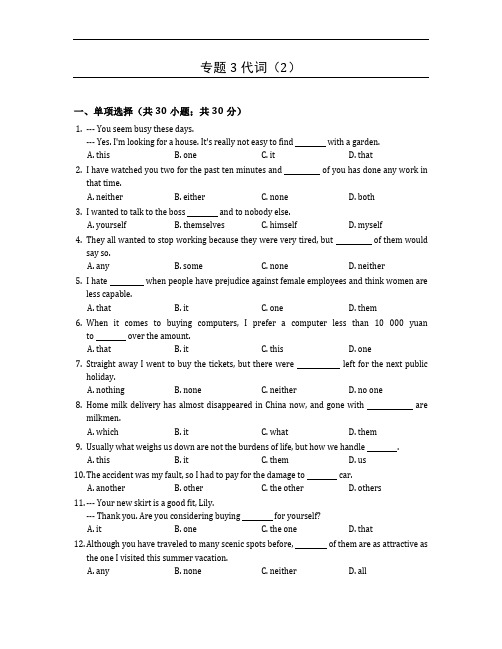
专题3 代词(2)一、单项选择(共30小题;共30分)1. --- You seem busy these days.--- Yes. I'm looking for a house. It's really not easy to find with a garden.A. thisB. oneC. itD. that2. I have watched you two for the past ten minutes and of you has done any work inthat time.A. neitherB. eitherC. noneD. both3. I wanted to talk to the boss and to nobody else.A. yourselfB. themselvesC. himselfD. myself4. They all wanted to stop working because they were very tired, but of them wouldsay so.A. anyB. someC. noneD. neither5. I hate when people have prejudice against female employees and think women areless capable.A. thatB. itC. oneD. them6. When it comes to buying computers, I prefer a computer less than 10 000 yuanto over the amount.A. thatB. itC. thisD. one7. Straight away I went to buy the tickets, but there were left for the next publicholiday.A. nothingB. noneC. neitherD. no one8. Home milk delivery has almost disappeared in China now, and gone with aremilkmen.A. whichB. itC. whatD. them9. Usually what weighs us down are not the burdens of life, but how we handle .A. thisB. itC. themD. us10. The accident was my fault, so I had to pay for the damage to car.A. anotherB. otherC. the otherD. others11. --- Your new skirt is a good fit, Lily.--- Thank you. Are you considering buying for yourself?A. itB. oneC. the oneD. that12. Although you have traveled to many scenic spots before, of them are as attractive asthe one I visited this summer vacation.A. anyB. noneC. neitherD. all13. We've been looking for a cheap house but haven't found we like yet.A. thatB. otherC. itD. one14. He is very smart and can be hidden from him.A. nothingB. somethingC. everythingD. anything15. We need two more chairs for the meeting. You can go to Room 502 to fetch . There'replenty there.A. bothB. fewC. twoD. ones16. Lowcarbon lifestyle is of great benefit to improve the world environment. can beenjoyed from it until you have a deep understanding of it, however.A. SomethingB. NothingC. FewD. Much17. In order to offer their children a better education, many parents will send them tocollege it takes, even if that means a huge amount of debt.A. whatB. thatC. whateverD. however18. Some children hate when their parents try to join their circle of friends.A. thatB. thisC. itD. them19. Because Henry and Mark had to work, of them came yesterday.A. bothB. noneC. neitherD. either20. Before "Wolf Father" promoted the book "That's why they go to Peking University", no onewould have imagined starting such a heated discussion on parenting.A. theyB. theirsC. heD. his21. --- The price is fine with me. How would you like paid?--- Well, it is up to you.A. oneB. thisC. thatD. it22. Both of the sofas they ordered online arrived, but fit through the doorway.A. noneB. norC. neitherD. either23. This young man is very clever; he may be Edison.A. the oneB. the otherC. anotherD. one24. Will you see to that my birds are well looked after while I am away?A. themB. yourselfC. itD. me25. These animals live in conditions similar to existed millions of years ago, whenanimals began making the transition from water onto land.A. thoseB. thatC. those thatD. what those26. --- Could you please buy me an MP5 as well as a digital camera, daddy?--- You can choose , not both, my dear.A. eitherB. anyC. eachD. every27. The previous lecture focused on the reading problems in new words, while this lecture willturn to in complex sentence structures.A. thatB. oneC. thoseD. ones28. --- Who will become the team member of the City Cup Final, Lionard or Jack?--- Oh, .A. eachB. no oneC. none of themD. possibly both29. Mrs. Smith managed to settle the quarrel between Michael and Allen without hurting thefeelings of .A. neitherB. noneC. eitherD. both30. Knowing the meaning of a word is one thing; yet using it both grammatically andcommunicatively properly is quite .A. muchB. anotherC. littleD. many二、完形填空(共20小题;共30分)It was only a few seeks after my surgery. I went to Dr. Belt's office for a 31 . It was just after my first chemotherapy treatment (化疗). My scar was still very tender. 32 , I was taken to an examination room to have my blood 33 , again—a terrifying process for me, since I'm so frightened of 34 .I lay down on the 35 . Then Ramona entered the room. Her 36 smile was familiar, and 37 in contrast to my fears. I'd first seen her in the office a few weeks earlier. She wasn't my 38 on that day, but I remember her because she was laughing. What could she 39 find to laugh about at a time like this? So I decided she wasn't 40 enough about the whole thing.But this day was 41 . Ramona had taken my blood before. She 42 my fear of needles, and she kindly 43 the medical equipment under a magazine. As we opened the layers of bandage, the 44 scar on my chest could be seen.She gently 45 over and ran her hand across the scar, 46 the smoothness of the healing skin. I began to cry gently and quietly. She brought her warm eyes to mine and said, “You haven't 47 it yet, have you?” And I said, “No.”I continued to cry gently. In 48 tones she said. “This is part of your body. This is you. It's okay to touch it.” But I couldn't. So she touched it for me. The 49 . The healing wound. And beneath it, she touched my heart.That night as I lay down, I gently placed my hand on my chest and I left it there 50 I fell asleep. I knew I wasn't alone.31. A. prescription B. discussion C. conversation D. checkup32. A. At once B. As usual C. In fact D. In addition33. A. drawn B. mixed C. corrected D. cleaned34. A. doctors B. nurses C. blood D. needles35. A. operation table B. office floorC. examining bedD. test bed36. A. warm B. bitter C. shy D. weak37. A. worked out B. stood out C. found out D. gave out38. A. girl B. partner C. nurse D. companion39. A. accidentally B. particularly C. possibly D. actually40. A. serious B. curious C. worried D. nervous41. A. difficult B. different C. pleasant D. common42. A. talked about B. got around C. knew about D. put away43. A. found B. replaced C. showed D. hid44. A. old B. fresh C. worn D. fine45. A. came B. went C. searched D. reached46. A. examining B. covering C. pressing D. removing47. A. watched B. discovered C. touched D. unfolded48. A. tough B. soft C. cold D. strict49. A. bandage B. soul C. pain D. scar50. A. until B. after C. since D. when三、阅读理解(共9小题;共18分)AYou may have seen a lot of frogs, but if you haven't, you must have heard about frogs. However, have you heard about a frog that can kill a person?These small brightly colored amphibians(两栖动物) live in the tropical rain forests of Central and South America. They are best known for their ability to kill persons even though they are no more than 2 inches long. If we touch their poisonous skin without proper protection (such as gloves), we may die! For animals of this size that can be so deadly, they are certainly one of the world's most poisonous animals! Who are they? They are poison arrow frogs or, simply, poison frogs.Poison frogs acquired their name from the Indians. The Indians catch and kill many of these frogs before hanging them upside down over a campfire. As the frogs get hot, the poison drips out of their skin. The Indians collect the poisonous liquid in a bottle and dip the tips of their arrows into the bottle. Once the tips are dried, they are ready to be used for their arrows.There are about 170 different types of poison arrow frogs in the world. Though most species have bright markings, either in stripes or patches, on their black bodies, some just wear noticeable single-colored coats. Their shocking skin colors—usually in yellow, red, green, blue or orange-serve as a warning sign to other animals. The sign simply says, "Stay away or pay with your life!" They certainly do not bluff.51. The 2nd paragraph mainly talks about .A. what poison frogs areB. where poison frogs liveC. why poison frogs are dangerousD. when poison frogs attack animals52. We can infer that the Indians may kill poison frogs in order to .A. treat diseasesB. avoid being bittenC. hunt animalsD. eat their meat53. According to the passage, poison frogs .A. can grow to several meters longB. like to change colors on the backC. have bright-colored skin or markingsD. are on the edge of dying out54. Which of the following best explains the last sentence of the passage?A. Poison frogs don't want to kill others.B. Poison frogs do not just scare others.C. Poison frogs want to stop others from coming near.D. Poison frogs just pretend to be dangerous animals.BAfter spending a year in Brazil on a student exchange program, her mother recalled, Marie Colvin returned home to find that her classmates had narrowed down their college choices. “Everyone else was already admitted to college,” her mother, Rosemarie Colvin, said from the family home. “So she took our car and drove up to Yale and said, 'You have to let me in.'”Impressed—she was a National Merit (国家精英) finalist who had picked up Portuguese in Brazil—Yale did admit her to the class of 1978, where she started writing for The Yale Daily News “and decided to be a journalist,” her mother said.On Wednesday, Marie Colvin, 56, an experienced journalist for The Sunday Times of London, was killed as Syrian forces (叙利亚空军) bombed the city of Homs. She was working in a temporary media center that was destroyed in the attack.“She was supposed to leave Syria on Wednesday”, Ms. Colvin said. “Her ed itor told me he called her yesterday and said it was getting too dangerous and they wanted to take her out. She said she was doing a story and she wanted to finish it.”Ms. Colvin said it was pointless to try to prevent her daughter from going to conflict zones. “If you knew my daughter,” she said, “it would have been such a waste of words. She was determined, she was enthusiastic about what she did, it was her life. There was no saying 'Don't do this.' This is who she was, absolutely who she was and what she believed in: cover the story, not just have pictures of it, but bring it to life in the deepest way you could.” So it was not a surprise when she took an interest in journalism, her mother said.55. From the underlined sentence in Paragraph 1 we can infer that .A. Yale University was her last choiceB. Marie Colvin was confident of herselfC. Yale must keep its promise to MarieD. Marie Colvin was good at persuading56. Marie Colvin's story suggests some of the best qualities of being a journalist are .A. patience and confidenceB. determination and courageC. flexibility and creativityD. honesty and curiosity57. Which of the following is the correct order to describe Marie Colvin's life?a. She was doing a story in Syria and got killed.b. She was admitted to Yale University.c. She studied in Brazil as an exchange student.d. She was hired by The Sunday Times of London.e. She began to take an interest in journalism.A. c→b→e→d→aB. d→e→c→a→bC. e→d→c→b→aD. b→c→d→e→a58. From the last paragraph we can know that Ms. Colvin .A. cares little about her daughterB. knows her daughter very wellC. dislikes the choice of her daughterD. doesn't fully appreciate her daughter59. What can be the best title of the text?A. Recalling Her Daughter, a Journalist Killed in SyriaB. Applying for Top Universities, a Successful CaseC. Covering Stories in a Dangerous Conflict AreaD. Choosing Lifelong Careers Based on Your Own Interest四、短文改错(共10小题;共10分)全文只允许修改10处错误,每处错误及其修改仅限一词,每句中最多有两处错误。
高考英语一轮复习语法突破专题三代词课件

(两者) 都不
neither...nor... 既不……也 不……
Neither of the
two boys is clever. 两个男孩 都不聪明。
either
(两者中的任 意一个)
either...or... 或者……或 者……;要 么……要 么……
There are flowers
on either side of the street. 街道两边都 有花。
other is in Shanghai.她
other...意为“一 有两个儿子。一个在北
个……另一个……”京,另一个在上海。
others
泛指其他的人 或物,相当于 He always helps others(=othe “other+复数 people).他总是帮助别人。 名词”
常用词组
There are lots of people in the
2.打电话时用 this 介绍自己,用 that 介绍对方。如: This is Mary speaking.Who's that? 我是玛丽。你是谁?
二、it,one/ones,that/those 作替代词时的区别
1.it 特指上文提到的同一对象,是同一事物。如: I have a new schoolbag.It's very nice. 我有一个新书包。它很漂亮。 2.one 泛指上文提及的同类事物中的一个(表示几个 时用 ones),同类而不同物。如: I have lost my umbrella.I think I must buy one. 我的伞丢了。我想我必须买一把。
our class.Thirty of us com to school by bike,and th
通用英语语法复习专题3 代词

代词
继续学习
高考复习讲义
考点全通关 9
3 every可用来表示"每隔",而each不可。
① every+基数词 +复数名词 ② every+序数词 +单数名词 ③ every other+单数名词 每隔一…… ④every few+复数名词 每隔几……
例 He visited his uncle every few days.他每隔几天就去看他叔叔。 例 Please write on every other line.请隔行写。
用作不定代词时,替代不可数名词;用作形容词时,修饰不可数名词。
例 Not many wanted to change their life in the town.镇上想改变自己生活的人并不多。 例 Many people are present now.现在有很多人在场。 例 The man didn’t say much about the accident.那个男子对那起事故没有说太多。 例 He is a poor man; he doesn’t have much money.他是个穷人,他的钱不多。
代词
继续学习
高考复习讲义
考点全通关 15
八、复合不定代词
某
任何
每个,所有
没有
人 someone/somebody anyone/anybody everyone/everybody no one/nobody
物 something
anything
everything
nothing
代词
继续学习
高考复习讲义
高考复习讲义
考情精解读 3
外研版高三英语一轮复习板块一第3讲人称代词、反身代词和物主代词课件
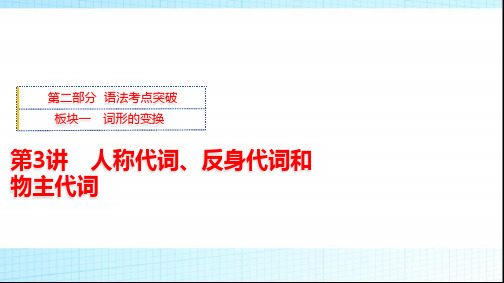
第二部分 语法考点突破 板块一 词形的变换
第3讲 人称代词、反身代词和 物主代词
题型
语法 填空
高考典题 1.(2022·全国乙卷)The Chinese Ancient Tea Museum was officially
unveiled(揭幕) at the ceremony,opening _i_ts_(it) first exhibition:The
you
him,her,it
第一 人称 we
us
反身代词
himself,herself, our-
my- self your- self
itself
selves
复数 第二 人称 you
you
yourselves
第三 人称 they
them
themselves
对点冲关训练
1.On my desk is a photo that my father took of _m_e_(I) when I was a baby. 2.That evening I went to hear __h_i_m___ (he) speak and was very impressed by his passion. 3.Our neighbours gave us a baby bird yesterday that hurt _i_t_se_l_f_ (it) when it fell off its nest. 4.If our parents do everything for _u_s (we) children,we won't learn to depend on ourselves.
just glad to find _t_h_e_m__(they) alive.
专题03 冠词和代词-备战2024年高考英语一轮复习查漏补缺大闯关100道必刷题(解析版)
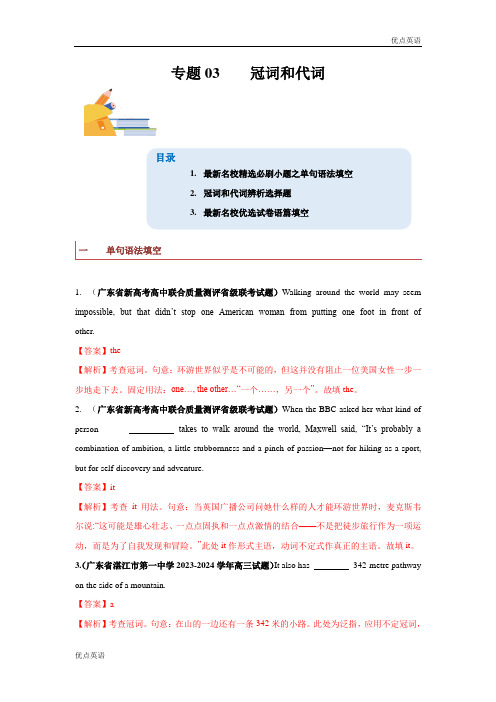
专题03 冠词和代词目录1.最新名校精选必刷小题之单句语法填空2.冠词和代词辨析选择题3.最新名校优选试卷语篇填空一单句语法填空1.(广东省新高考高中联合质量测评省级联考试题)Walking around the world may seem impossible, but that didn’t stop one American woman from putting one foot in front of other.【答案】the【解析】考查冠词。
句意:环游世界似乎是不可能的,但这并没有阻止一位美国女性一步一步地走下去。
固定用法:one…, the other…“一个……,另一个”。
故填the。
2.(广东省新高考高中联合质量测评省级联考试题)When the BBC asked her what kind of person______ takes to walk around the world, Maxwell said, “It’s probably a combination of ambition, a little stubbornness and a pinch of passion—not for hiking as a sport, but for self-discovery and adventure.【答案】it【解析】考查it用法。
句意:当英国广播公司问她什么样的人才能环游世界时,麦克斯韦尔说:“这可能是雄心壮志、一点点固执和一点点激情的结合——不是把徒步旅行作为一项运动,而是为了自我发现和冒险。
”此处it作形式主语,动词不定式作真正的主语。
故填it。
3.(广东省湛江市第一中学2023-2024学年高三试题)It also has 342-metre pathway on the side of a mountain.【答案】a【解析】考查冠词。
句意:在山的一边还有一条342米的小路。
2024年高考英语一轮复习第3讲代词
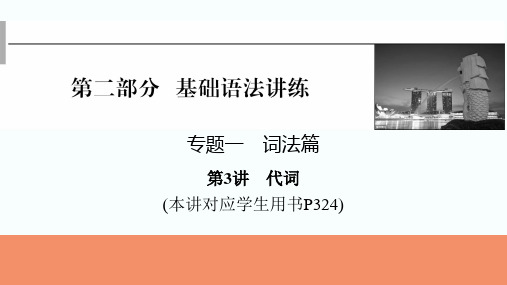
高考总复习·英语
♥解题策略 解代词类题目“三步走” ▼如何确定填代词:无提示词的语法填空题,当句子缺少主语或宾语时, 首先考虑填代词。 ▼具体填什么代词:分析句子成分,如果句子缺主语,则可填人称代词 主格、指示代词、不定代词或it;如果句子缺宾语,则可填人称代词宾格; 如果宾语与主语是指同一人,应用反身代词。在语法填空题中,涉及代 词时一定要从上下文考虑,代词指代的是人还是物,是男还是女,是单 数还是复数。 ▼分析句式是否涉及it。
高考总复习·英语
help oneself to 随便吃/用 enjoy oneself 玩得开心 seat oneself 就座;入席 make oneself at home 别客气;随便;无拘束 teach oneself 自学 adapt/adjust oneself to 适应于
高考总复习·英语
高考总复习·英语
2.both/all/either/any/neither/none
范围
都 任何一个 都不(全部否定) 不都(部分否定)
两者 both either neither=not either both和not连用
三者或 三者以上 all
any none=not any
all和not连用
环境等
现在是初春,但是天气已经很热了。
Although he didn’t like the movie, I 代替前面提过的事物、群体、 decided to see it. 想法、内容等或代替指示代词 尽管他不喜欢看这部电影,但我还是
决定去看一看。
指不知性别的孩子和婴儿或不
明确的人(由于某种原因而不知 对方是谁)
Even if the answer seemed a little
高考英语一轮复习 精品语法课件 专题3 正反解读代词 新人教版
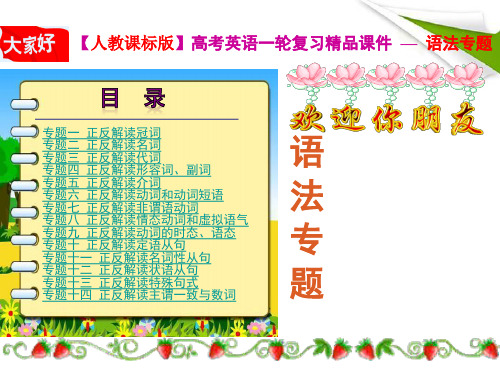
专题三 │ 正面解读
• 2. it 用作形式宾语的用法 • 当不定式、动名词、从句等用作宾语且其后跟有宾语补足语 时,常在宾语补足语前使用形式宾语,而将真正的宾语移至句末。 it用作形式宾语的两类特殊句式: • (1) 动词+it+if / when从句。 • 当enjoy, like, dislike, love, hate, prefer, appreciate等动词后 需要接一个if或when引导的从句时,此时需要先在动词后接it作形 式宾语。如: • I would appreciate it very much if you would help me with it. 如果你能帮助我做这事,我会十分感激。
专题三 │ 正面解读
• 4.
两者 both或 eitheThey were all very tired,but none of them would stop for a break. ②—Do you want tea or coffee? —Either. I really don't mind. ③—When can I come for the book? —Any day you like next week.
【人教课标版】高考英语一轮复习精品课件 — 语法专题
专题一 正反解读冠词 专题二 正反解读名词 专题三 正反解读代词 专题四 正反解读形容词、副词 专题五 正反解读介词 专题六 正反解读动词和动词短语 专题七 正反解读非谓语动词 专题八 正反解读情态动词和虚拟语气 专题九 正反解读动词的时态、语态 专题十 正反解读定语从句 专题十一 正反解读名词性从句 专题十二 正反解读状语从句 专题十三 正反解读特殊句式 专题十四 正反解读主谓一致与数词
专题三 │ 正面解读
高三英语一轮复习语法专题三代词课件

单数 复数
一本/一些书
另外一个/一些书 剩余的一本/一些书
one book another book the other book
some books other books
the other books
2. many,much,few,little,a few, a little的区别
多
少
复数名词概念 many
any
anyone anybody anything
no
none/no one nobody
no;
复合不定代词作主语,谓语动词用单数
四、反身代词
单数 复数
第一人称 第二人称 第三人称 himself,
myself yourself herself, itself
替代
one
a/an+单数名词
ones
零冠词+复数名词
the one
the+单数名词
the ones that those
the+复数名词
the+单数名词或不可数名词(尤其是 有后置定语时)
the+复数名词(尤其是有后置定语时 )
教学质量提升是一项系统工程,涉及到多个方面、各个维度,关键是要抓 住重点、以点带面、全面突破,收到事半功倍的效果。
英语 一、英语听力:要坚持每天听1、调整并保持听力状态很重要。建议考前, 考生要保持每天20分钟的听力练习量。 2、真题最好反复演练。最后的30天,主要应该听去年各省市的高考听力试 题和仿真度比较高的今年各市一模、二模试题。 3、听写训练。做一些真题的听写训练。基本方法,先整体听一遍,然后听 一句写一句,坚持听写完为止,然后再对照原文,检查自己错在哪里。另外值 得一提的是,在正式考试中,做完所有听力20道选择题后,一般来说,没有百 分之百的把握,不要轻易改动第一次做好的答案。据统计,第一次选择往往比 改动后的选择更可靠。
- 1、下载文档前请自行甄别文档内容的完整性,平台不提供额外的编辑、内容补充、找答案等附加服务。
- 2、"仅部分预览"的文档,不可在线预览部分如存在完整性等问题,可反馈申请退款(可完整预览的文档不适用该条件!)。
- 3、如文档侵犯您的权益,请联系客服反馈,我们会尽快为您处理(人工客服工作时间:9:00-18:30)。
专题三代词[全国卷考情分析]题型分类典题试做命题解读语法填空1.(2017年全国卷Ⅱ)However,the railwayquickly proved to be a great success and withinsix months,more than 25,000 people were usingit every day.2.(2016年全国卷Ⅰ)On my recent visit,I helda lively threemonthold twin that had beenrejected by its(it) mother.1.考查人称代词的主格和宾格;2.考查物主代词的基本用法;3.考查it的基本用法;4.考查不定代词和替代词的基本用法。
短文改错1.(2017年全国卷Ⅱ)Mr.and Mrs.Zhangwork in our school.【导学号:65670173】2.(2016年全国卷Ⅰ)My uncle says that he neverdreams of becoming rich in a short period oftime.Instead,he hopes that our→his businesswill grow steadily.1.代词单复数的错用;2.人称代词与物主代词的错用;3.不定代词的错用;4.代词与其所指代的对象不符。
(对应学生用书第232页)Ⅰ.单句语法填空1.(2016年北京高考)We are very proud of ourselves(we) and believe we can do more for a better world.【导学号:65670174】2.(2017年江西九江一模)We valued every chance we could to keep us(we) both on the right track. Ⅱ.单句改错(2016年四川高考)When he came back,I found a bunch of flowers in her hand.her→his[再解读要点]1.人称代词人称代词有主格(I,we,they,he,she,it)和宾格(me,us,them,him,her,it)等之分。
主格在句中作主语;宾格用在及物动词或介词后作宾语,也可作表语或同位语。
To really understand a man we must judge him in misfortune.只有在不幸时才能真正了解一个人。
2.物主代词形容词性物主代词(my,your,his,her,its,our,your,their)相当于形容词,在句中只能作名词或动名词的前置定语,不能单独使用。
名词性物主代词(mine,yours,his,hers,its,ours,yours,theirs)相当于“形容词性物主代词+名词”,可单独作主语、表语和宾语,也可与of连用作后置定语,但不能单独作定语。
(朗文辞典)The main difference between our brains and those of monkeys is that ours are bigger.我们的大脑和猴子的大脑之间的主要差别在于我们的要大些。
3.反身代词(1)反身代词(myself,ourselves,yourself,yourselves,themselves,himself,herself,itself)在句中可用作宾语或表语、同位语。
还可以作名词或代词的同位语,加强语气,表示“亲自,本人”的意思。
(上海高考)If our parents do everything for us children,we won't learn to depend on ourselves. 如果我们的父母为我们孩子们做一切,我们就无法学会独立。
(2)含有反身代词的习惯用语by oneself单独地,独自地for oneself亲自,为自己seat oneself 坐下behave oneself 举止得体say to oneself心里想talk to oneself自言自语enjoy oneself 过得愉快devote oneself to 致力于help oneself to 随便吃;随便用apply oneself to 专心致志于make yourself at home 不拘束come to oneself恢复知觉;苏醒过来adapt/adjust oneself to适应于abandon oneself to沉迷于,放纵于express oneself 表达某人的思想lose oneself in (=be lost in)迷失[先试做题组]Ⅰ.单句语法填空1.I don't like this room.I'm going to ask for another.2.(2017年山西太原二诊)Both teams were in hard training; neither was willing to lose the game. Ⅱ.单句改错(2017年江西六校联考)Failure is part of our life.Somebody has achieved great success without lots of failures.Somebody→Nobody[再解读要点]1.all,both,either,any,none,neitherany useful suggestions.以这个调查为基础,研究团队做了两个报告,但是两个都不包含任何有用的建议。
(江西高考)—When shall I call,in the morning or afternoon?——我什么时候(给你)打电话方便,上午还是下午?—Either.I'll be in all day.——都可以,我将一整天都在家。
2.none,nothing,no one/nobody(湖北高考)Even if the answer seemed a little strange,nobody but I doubted it.尽管这个答案好像有点奇怪,但是除了我之外没人怀疑它的正确性。
(2015年四川高考)Niki is always full of ideas,but none is useful to my knowledge.尼基点子总是很多,但是据我所知,没有一个是有用的。
易错警示部分否定和全部否定(1)no one,none,nobody,nothing,not...any/either以及“no+名词”都表示全部否定;(2)all,both,everyone/everybody/everything以及“every+名词”与not 连用时,表部分否定。
3.other,the other,others,the others,anotherthe other.为了暖和自己,那个海员坐在火堆前,两只光脚丫互相蹭着。
(福建高考)In some countries,people eat with chopsticks,while in others,knives and forks. 在一些国家,人们用筷子吃饭,而在另外一些国家,人们用刀叉吃饭。
[先试做题组]Ⅰ.单句语法填空1.(2017年湖南衡阳八中、永州四中联考)I was conscious all the time when I was flying through the air,and it seemed a long time.2.(2017年安徽望江中学月考)He admitted that when it comes to repairing a computer,he had little knowledge of it.【导学号:65670175】Ⅱ.单句改错Sometimes we may find difficult to follow the teacher and some slow learners may even give up learning English.在find后加it[再解读要点]1.指代前面所提到过的事情、事物、想法等,也可指代不清楚或没必要知道性别的说话对象。
还指代时间、地点、距离、天气、季节等。
(北京高考)The employment rate has continued to rise in big cities thanks to the efforts of the local governments to increase it.由于当地政府的努力,大城市的就业率不断上升。
易错警示替代词(it ,that ,one)的用法区别不定式充当。
(天津高考)It is obvious to the students that they should get well prepared for their future. 对学生来说非常清楚的是他们应该为他们的将来做好准备。
(山东高考)The two girls are so alike that strangers find it difficult to tell one from the other. 这两个女孩长得很像,陌生人很难把她们区分开来。
3.含有it 的常考短语或句型。
(1)It depends.视情况而定。
Take it easy.别着急。
believe it or not 信不信由你 make it 成功,做到,约定时间 as someone puts it 像某人所说的那样 When it comes to...当涉及/谈到…… keep it in mind that...把……铭记在心(2) It's (high) time that sb.should do/did sth.是某人该做某事的时候了。
It's the first/second/...time that sb.have/has done sth.是某人第一次 /二次/……次做某事。
It is/has been...since...自从……多久了。
It will be/was...before...要过……时间才…… It is/was +时间点+when...当……时候,时间是…… (3)It is/was +被强调部分+that/who... [技法点拨]在这里输入您的标题在这里输入您的内容。
